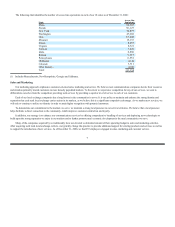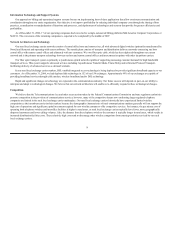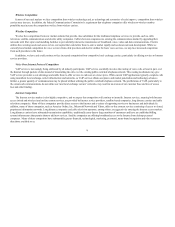FairPoint Communications 2006 Annual Report Download - page 19
Download and view the complete annual report
Please find page 19 of the 2006 FairPoint Communications annual report below. You can navigate through the pages in the report by either clicking on the pages listed below, or by using the keyword search tool below to find specific information within the annual report.
requirement for non-discriminatory treatment of traffic over broadband networks. It is too early to predict what, if any, impact this may have on our business.
In 2005, the Federal Communications Commission adopted FCC Order 05-150, which puts wireline broadband Internet access service, commonly
delivered by DSL technology, on an equal regulatory footing with cable modem service. This approach is consistent with a 2005 United States Supreme Court
decision upholding the Federal Communications Commission’s light regulatory treatment of cable modem service. Specifically, the Federal Communications
Commission determined that wireline broadband Internet access services are defined as information services functionally integrated with a telecommunications
component. In the past, the Federal Communications Commission required facilities-based providers to offer wireline broadband transmission components
separately from their Internet service as a stand alone service on a common-carrier basis, and thus classified that component as a telecommunications service.
The Federal Communications Commission order provides an option which allows rate of return carriers, such as our operating companies, the option to
continue providing DSL service as a common carrier (status quo) offering but carriers are no longer required to do so.
Environmental Regulations
Like all other local telephone companies, our 31 local exchange carrier subsidiaries are subject to federal, state and local laws and regulations governing
the use, storage, disposal of, and exposure to hazardous materials, the release of pollutants into the environment and the remediation of contamination. As an
owner of property, we could be subject to environmental laws that impose liability for the entire cost of cleanup at contaminated sites, regardless of fault or the
lawfulness of the activity that resulted in contamination. We believe, however, that our operations are in substantial compliance with applicable environmental
laws and regulations.
We make available on our website, www.fairpoint.com, our Annual Reports on Form 10-K, Quarterly Reports on Form 10-Q, Current Reports on
Form 8-K and all amendments to such reports as soon as reasonably practical after we file such material with, or furnish such material to, the SEC.
Any of the following risks could materially adversely affect our business, consolidated financial condition, results of operations or liquidity or the
market price of our common stock. The risks described below are not the only risks facing us. Additional risks and uncertainties not currently known to us
or that we currently deem to be immaterial may also materially and adversely affect our business operations.
Risks Related to our Common Stock and our Substantial Indebtedness
Our board of directors has adopted a dividend policy which reflects an intention to distribute a substantial portion of the cash generated by our business
in excess of operating needs, interest and principal payments on our indebtedness, dividends on our future senior classes of capital stock, if any, capital
expenditures, taxes and future reserves, if any, as regular quarterly dividends to our stockholders. Our board of directors may, in its discretion, amend or
repeal this dividend policy. Our dividend policy is based upon our directors’ current assessment of our business and the environment in which we operate,
and that assessment could change based on regulatory, competitive or technological developments (which could, for example, increase our need for capital
expenditures) or new growth opportunities. In addition, future dividends with respect to shares of our common stock, if any, will depend on, among other
things,
17
























